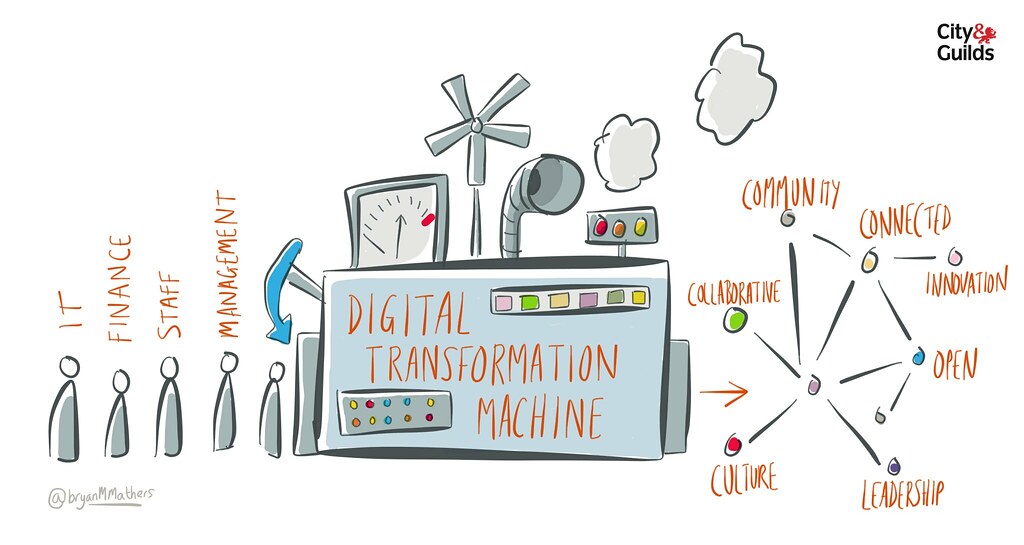
The manufacturing industry has always been driven by efficiency, innovation, and scalability. However, as technology advances at an unprecedented pace, manufacturing companies are increasingly relying on digital tools to stay competitive and meet the demands of a global market. A digital transformation company plays a vital role in guiding manufacturers through the integration of cutting-edge technologies, such as automation, AI, and IoT, to optimize production lines, improve quality control, and reduce downtime.
Meanwhile, an IT consultant company ensures that the IT infrastructure needed to support these technologies is secure, scalable, and capable of handling the increased demands of a modernized manufacturing operation. Together, these partnerships enable manufacturers to innovate without compromising on security or efficiency.
The Role of Digital Transformation in Manufacturing
Digital transformation is fundamentally changing the way manufacturing companies operate. By integrating technologies like AI, machine learning, and robotics, manufacturers can automate repetitive tasks, improve production speed, and enhance the quality of their products. A digital transformation company helps manufacturing businesses adopt these technologies, ensuring that they are implemented efficiently and aligned with long-term business goals.
- Automation and Robotics in Production
Automation has long been a part of the manufacturing process, but digital transformation is taking it to the next level. Today’s factories are incorporating robots and AI-driven machinery that can work autonomously, performing complex tasks faster and more accurately than human workers. This not only increases productivity but also reduces the risk of human error.
By partnering with a digital transformation company, manufacturers can implement robotics and AI systems that optimize production lines. These technologies enable companies to operate more efficiently, meet higher production targets, and reduce costs associated with labor and errors. - IoT for Smart Manufacturing
The Internet of Things (IoT) is revolutionizing the way manufacturers monitor and manage their production processes. With IoT-enabled devices, manufacturers can collect real-time data from machines and equipment, enabling predictive maintenance, reducing downtime, and ensuring that operations run smoothly.
A digital transformation company can help manufacturers integrate IoT systems that provide real-time insights into their production processes. This data can be used to optimize equipment performance, predict potential failures before they occur, and ensure that machines are running at peak efficiency.
How IT Consultant Companies Support Manufacturing Innovation
While digital transformation is key to modernizing manufacturing operations, these advancements rely heavily on a secure and scalable IT infrastructure. An IT consultant company plays an essential role in ensuring that manufacturers have the right systems in place to support their digital initiatives and protect their operations from cyber threats.
- Cybersecurity in Manufacturing
As manufacturing becomes more reliant on digital systems and connected devices, the risk of cyberattacks increases. Hackers could potentially disrupt production, steal intellectual property, or sabotage equipment through malicious attacks. Protecting sensitive data and operational systems is crucial for maintaining business continuity and avoiding costly downtime.
An IT consultant company helps manufacturers implement robust cybersecurity measures, such as network segmentation, firewalls, and encryption, to protect critical systems. IT consultants also provide ongoing monitoring to detect and respond to potential threats, ensuring that manufacturing operations remain secure and uninterrupted. - Optimizing IT Systems for Scalability
As manufacturers adopt more advanced technologies, they need IT systems that can scale with their growing needs. Whether it’s managing increased data from IoT devices or supporting more automation on the factory floor, IT consultants ensure that the infrastructure can handle the increased demands.
An IT consultant company assists manufacturers in optimizing their IT systems, recommending upgrades or cloud-based solutions that offer flexibility and scalability. Cloud platforms, for instance, enable manufacturers to store and process large volumes of data without the need for costly hardware investments, allowing them to scale operations quickly and efficiently.
Key Benefits of Digital Transformation for the Manufacturing Industry
- Improved Efficiency and Productivity
One of the most significant benefits of digital transformation in manufacturing is the ability to increase efficiency and productivity. Automation and AI allow manufacturers to speed up production processes while maintaining high levels of accuracy. Additionally, IoT systems provide real-time data that can be used to optimize equipment performance and reduce downtime.
By working with a digital transformation company, manufacturers can implement technologies that streamline their operations, allowing them to produce more in less time and with fewer resources. This leads to significant cost savings and a stronger competitive edge in the market. - Enhanced Quality Control
Quality control is a critical aspect of manufacturing, and digital tools can play a key role in ensuring that products meet the highest standards. AI-powered quality control systems can inspect products in real-time, identifying defects or inconsistencies that may be missed by human inspectors. This not only improves the quality of the final product but also reduces waste.
A digital transformation company helps manufacturers adopt AI-driven quality control systems that improve accuracy and consistency, leading to fewer defects and higher customer satisfaction. - Reduced Downtime Through Predictive Maintenance
Unplanned downtime can be costly for manufacturers, leading to lost production time and increased repair costs. However, with IoT-enabled predictive maintenance systems, manufacturers can monitor the health of their equipment in real-time, identifying potential issues before they lead to failure.
By partnering with a digital transformation company, manufacturers can implement predictive maintenance solutions that reduce downtime and extend the lifespan of their equipment. These systems help manufacturers avoid costly repairs and ensure that production runs smoothly without interruptions.
The Collaboration Between IT Consulting and Digital Transformation in Manufacturing
Both IT consultant companies and digital transformation companies are critical to the successful modernization of the manufacturing industry. While digital transformation focuses on adopting new technologies that enhance production, quality control, and operational efficiency, IT consulting ensures that the underlying infrastructure is secure, scalable, and capable of supporting these advancements.
For instance, while a digital transformation company might introduce IoT systems to improve real-time monitoring of equipment, an IT consultant company ensures that the data collected by these devices is stored securely and complies with regulatory requirements. Similarly, as manufacturers adopt cloud-based platforms for data storage and processing, IT consultants manage the migration process, ensuring minimal disruption to operations.
By working together, these two partners provide a comprehensive approach to manufacturing innovation, enabling companies to fully leverage the benefits of digital transformation while maintaining a secure and efficient IT environment.
Conclusion
The manufacturing industry is at the forefront of digital transformation, with technologies like automation, AI, and IoT driving significant improvements in efficiency, quality, and productivity. By partnering with a digital transformation company, manufacturers can adopt these technologies to streamline operations, enhance product quality, and reduce costs. At the same time, an IT consultant company ensures that the IT infrastructure is secure, scalable, and capable of supporting these innovations, protecting operations from cyber threats and ensuring business continuity.
Together, these partnerships help manufacturers stay competitive in a rapidly changing industry, delivering high-quality products while optimizing efficiency and reducing operational costs.




